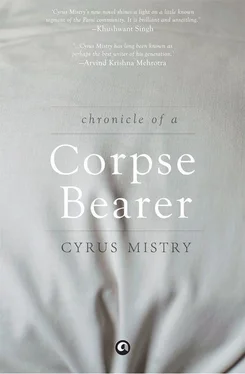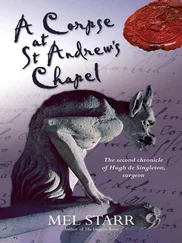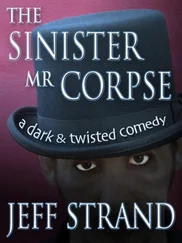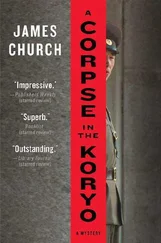Later, I heard from those who had been present, there was a curiously contrived temper to the whole episode, as if the objective was to intimidate the culprits of yesterday’s destructive merriment, rather than apply the rule of law. Why a police officer should be so partisan in an ostensibly criminal matter was something that wasn’t speculated upon until much later, but I’m glad to say our boys, and Buchia as well, suffered these indignities without feeling cowed; in fact, they displayed a healthy and outraged resistance.
While all this was happening, myself, Jungoo and Kobaad were out. We drove back in the hearse with the corpse we had gone to fetch to a dark and desolate Towers of Silence with hardly anyone about. The sun had already set, and the whole place was immersed in an air of mourning. Luckily Edul had plucked up the courage to phone Coyaji as soon as the police van drove away and inform him of the arrests. Next morning all twenty-two prisoners were brought before a magistrate, and released on bail, for which the required amounts were put up by the Punchayet.
Three weeks later, when the case came up for hearing, the Punchayet’s lawyers had built a strong defence for its clients: land records had been dug up, certified gift deeds were produced and the verbal testimony of old-timers like Rustom and Fardoonji invoked to assure the magistrate that the land which the Sheikh brothers were claiming had never been in their, or their father’s, possession during the last twenty years. As for the relatively minor charge of assault on the watchman, some clever cross-examining of his deposition deflated the claims of ‘serious injuries inflicted by a murderous mob’.
As a final and dramatic trump in support of their contention, a handwritten receipt was produced by the plaintiffs— acknowledging payment of Rs 12,000 by a Mohammed Ghulam Sheikh to the Parsi Punchayet in 1919. But a brief examination of the paper by the court’s clerk, and then the magistrate himself, led him to observe that it was entirely deficient in details of the plot allegedly purchased; and moreover only semi-literate in its language. It was rejected by the magistrate outright as a ‘crude and unconvincing’ attempt at forgery; the case was dismissed.
The deputy commissioner of police, Strickham, too, came in for some strongly censorious comments from the English magistrate, a man called Peabury, who found the policeman’s entry into the Towers of Silence on horseback, and his handcuffing of the accused ‘overzealous beyond the farthest limits of civility’. This observation made in court was widely reported in the Indian press; and word of mouth even insinuated that Strickham was corrupt, and had probably received a large amount of money from the Sheikhs to behave in the way he did.
(ii)
Several months after this rumpus died down, we were already on the cusp of 1947—the year in which India got her independence — when, late one evening, I had a visitor at my quarters whom I didn’t immediately recognize.
It was already dark when he knocked at my door, and though we now had electric lights at Doongerwaadi, the one on my veranda hadn’t been turned on.
‘Phiroze. .?’
It was a husky, soft voice, which sounded familiar, but I couldn’t place it. Only when the stranger drew closer as though wishing to embrace me, I recognized him at once: it was my old school buddy.
‘Rohinton?’
His face was round, his shoulders broad and fleshy: expansively at ease with himself in a colourful bush shirt, he still retained much of his baby fat but his features seemed wrinkled and pitted: Rohinton Kanga all right, but no longer the carefree and cheerful friend I remembered. Before I could stop him, he enveloped me in his arms and hugged me tightly. I was seeing him again after the passage of a very long time.
I observed only one unexpected change in his appearance. Like myself, he too had lost most of his hair; but, in his case, two outgrowths at the rear extreme of his crown — grey, hopelessly entangled bushes, straggling sideways — gave him the mien of a winged creature caught in a moment of fluttery indecision before taking flight.
‘Better have a thorough bath, once you get home,’ I said, apologetically. ‘I’ve just got back from washing a very old dead man. .’
He grimaced, opening his mouth wide and cried dismissively:
‘ Aaargh . .! Bullshit, all bullshit. Baloney. Makes no sense at all. . Anyway, I’m so happy to see you again, Phiroze,’ and he gave me another bear hug.
‘It’s what — fifteen years — since you left for England?’
‘Fourteen, actually. Oh, I’ve been back, I’ve been back before. .’ said Rohinton apologetically, ‘several times as a matter of fact, but never thought to look you up. .until this time, when I need your help.’
‘That’s fine, no problem. I’m a nussesalar, you know, a “Custodian of the Unclean”,’ I reminded him. ‘You could hardly have invited me to a social gathering of your family and friends, and expected them to welcome me warmly.’
‘Why not? Why not!’ asked Rohinton angrily, emphatically. ‘I just don’t believe in all that bullshit.’
‘You’d be surprised how deeply ingrained these beliefs are. .I don’t believe myself as a rule that exposure to corpses contaminates the living, yet right now I feel an urgent need to bathe. I’ll feel uneasy and restless until I do. But tell me what—’
‘Don’t let me stop you, don’t let me stop you. . Please, go ahead. I’ll wait.’
‘You said you needed some help?’
‘Well, yes, we’ll talk about that when you’re feeling more relaxed. It was my dad who suggested to me, reminded me in a sense, that you might be able to help us.
‘In what way?’
‘In this whole matter of Joseph’s last rites. . Maybe you should have your bath first? Then we’ll talk at length. . And besides, I’m sure there’s so much else we have to catch up on as well. .’
It was then the penny dropped. So Joseph Maloney was Nariman’s first son by his Irish wife. And the entire hullabaloo that had been going on for the last two weeks or so — I was only vaguely aware of its shrill repercussions — about a Christian foreigner who had renounced his faith, and was seeking permission from his deathbed to be allowed a Zoroastrian funeral — was Rohinton’s half-brother! During all the hours I had spent in my youth at Mon Repos , Rohinton’s sprawling Mazagaon bungalow, never once had I set eyes on this ruddy half-Irish half-Parsi whose moribund spiritual aspirations were exercising Zoroastrian passions in the city of Bombay to a never-before-scaled pitch of rabidity.
‘Please do sit, Rohinton. Make yourself comfortable. I won’t be long.’

When I came out of the bathroom, I saw that Farida had made some tea for us. Rohinton was sipping his appreciatively, while another cup, covered with an upturned saucer, waited for me.
‘When Margaret went back to Ireland, Joseph went with her. My father couldn’t make that first marriage work. .but soon after — the poor boy was only six then — she fell ill and, in a few months, died. He was brought up in Ireland, and later England, by her relatives.
‘Though he retained his mother’s name, Maloney,’ said Rohinton, not wasting much time on preliminaries, ‘Joseph claims he’s always felt a deep connection with my dad, which he was able to renew only after so many years. In the meanwhile, at Oxford, he had studied World Religion, and even done a doctorate in Zoroastrianism. .but then it was not so much his intellectual appreciation of our religion, as his visits to Bombay and his meetings with my dad that deepened his desire to convert to Zoroastrianism.’
Читать дальше













